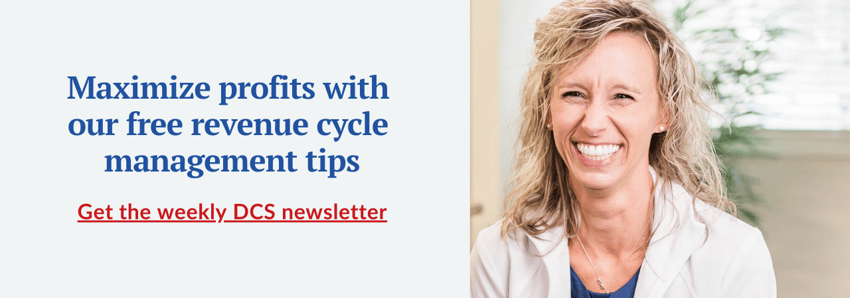6 signs you’ve got the most effective dental office manager
.jpg)

Most people outside the dental industry don’t realize this, but your office manager is the heart of your practice. A talented and savvy office manager creates consistent cash flow by keeping everything running smoothly, from operations and scheduling to billing and collections.
In many ways, your office manager is not just managing the office—they’re managing your business.
“I feel that the person who is in charge of the practice is an operations manager. That’s because they are not just in charge of the office, but truly in charge of the operations of the whole business.” —Dr. Lou Shuman, Cellerant Consulting founder
When your office manager is effective, you can feel it: your team is happy, your patients are satisfied, and your finances are healthy. It becomes even more obvious when an office manager is struggling or overwhelmed because it shows in faulty operations: scheduling gaps, missed payments, and frustrated staff.
Our team at DCS loves dental office managers—they’re typically our primary point of contact for the dental practices we work with. Our services and products take an administrative load off the office manager, so they can focus their time and energy on running the practice and serving patients.
But let’s rewind—we know how important the dental office manager is, so we also know what makes for an all-star office manager. Do you? Keep reading for 6 signs to help you know for sure.
Key takeaways to recognizing an amazing dental office manager:
- Dental office managers are multi-talented, and deserve massive appreciation from their dental business’s owner and teams
- The best dental office managers know how to ask for help when their trusted workflow stops meeting their needs
- Outsourced dental billing supports dental office managers; it doesn’t replace them
Sign #1. Your practice schedule stays full
A packed, productive schedule is a promise of steady revenue, and also a sign of generally healthy operations — and a top-notch office manager.
They will optimize a scheduling system that ensures appointments are booked in advance and confirmed strategically—usually 3 weeks before the appointment and again 7 days prior.
This office manager embraces their responsibility to create value around the doctor’s availability by minimizing no-shows and helping patients understand that missed appointments aren’t only inconvenient—they’re also missed opportunities for their care.
A full practice schedule means your office manager is making sure that your providers maximize production, your patients stay on track with treatment, and your practice is set up to thrive.
Sign #2. High collections from dental insurance with a low aging report
Your dental office can only be profitable if it consistently collects what it’s owed. For in-network dental practices, one of the entities you collect from is dental insurance.
Effective insurance collections starts with a strong insurance verification process: benefits should be verified at least 3 business days before appointments. This keeps your patients’ in-office experience moving along effortlessly and reduces denials when your team submits claims. 
For maximum efficiency and prompt reimbursement, your insurance claims should also be created and submitted within 24 hours of procedures, and your insurance aging report should be “worked” weekly through follow-up, research, and resubmissions.
A 5-star office manager will have clear systems in place for all of this, whether they perform these tasks or delegate them.
They know that when insurance claims aren’t followed up on, the aging report starts to grow fast—and the older a claim is, the harder it is to collect. Keeping the aging report in check through consistent maintenance is a savvy strategy to protect your cash flow.
Related: Sky-high Dental A/R? Here's how to boost dental insurance collections
Sign #3. Patient collections are high and cash flow is steady
Even with well-managed insurance claims, practices lose revenue and write off earnings when patient balances go uncollected.
An all-star office manager will ensure patients understand their financial responsibility before treatment begins through the consistent execution of detailed and accurate presentations.
They’ll also ensure there’s an easy-to-use process in place to collect patient payments on the day of service and establish installment plans to make payments manageable — better a slow payout than no payout.
Collecting from patients can sometimes be difficult—especially because it’s essential to maintain goodwill with each one. But your business depends on their payment, so polite but persistent follow-up is necessary for all unpaid patient statements.
When you have an all-star office manager, you can be assured that your patients are:
- Aware of their insurance plan’s details
- Have received an accurate estimate of their out-of-pocket costs, and
- Have been offered every opportunity to pay you in a timely manner with no drama and minimal back-and-forth contact.
Get a product that helps you collect seamlessly from dental patients here.
Sign #4. They are the Jack (or Jill) of all trades for your dental office
A strong office manager doesn’t just delegate, they also understand every process they oversee and implement. This means they can jump in whenever and wherever needed and train new team members effectively.
They’re aware that pauses in production and paperwork create inconsistent cash flow, so they know exactly how to:
- Post payments
- Create and submit claims
- Work the insurance aging report
- Manage insurance billing as a whole
- Keep the schedule flowing and full
- Handle patient communication and payments
When your office manager has intimate knowledge of your office workflows and processes, they can adapt quickly to keep your practice running despite changes and unwelcome surprises, such as staff absences, location expansion, staff shortages, or weather emergencies.
Sign #5. Your office has a positive work culture
A healthy dental office culture starts with strong leadership — your office manager sets the tone: Are they proactive or reactive? Do they handle mistakes with a focus on solutions or blame? Are they approachable and respected, or distant and feared?
At DCS, we believe a positive work culture is everything because we’ve observed that it has a huge impact on the overall success of any dental business. When leadership is lacking, team morale plummets in the toxic environment, and staff turnover is high.
But when you have the right office manager in place, your office is a space where people work well together, stay motivated, stay employed there, and treat each other—and your patients—with kindness and respect.
And when things inevitably go awry, a top-notch office manager will work with and for your team to bring about speedy and satisfying resolutions. Their years of experience and training as an office manager guide them in nurturing and cultivating a healthy, well-balanced work environment.
Read more: 10 ways to create a healthy work culture your dental team loves [Free Guide]
Sign #6. Your practice is growing
The proof is in the numbers. The best office managers don’t just maintain your practice—they drive and encourage growth by optimizing operations, reducing overhead, and identifying opportunities to increase revenue.
Whether it’s improving your patient experience, helping implement new technology, or creating efficiencies in billing, top office managers are always thinking one step ahead and are ready to take on new challenges — and securing buy-in from the rest of the team.
And here’s the good news: they don’t have to do any of this vital work alone. Even if you already have the world’s best office manager, things can still get better.
With the right support from external providers, your office manager can multiply their impact without multiplying their workload.
Multiply your office manager’s impact without multiplying their workload when you partner with DCS
To recap, here are 6 signs you have an effective dental office manager:
- Your practice schedule stays full
- High collections from dental insurance with a low aging report
- Patient collections are high and cash flow is steady
- They are the Jack (or Jill) of all trades for your dental office
- Your office has a positive work culture
- Your practice is growing
At DCS, we don’t replace office managers — we reinforce their strengths. Our services and solutions assist office managers of all levels in running more efficient offices, especially when it comes to billing, collections, and revenue management.
With the support of our expert teams, your office manager can focus on what really matters: caring for your patients, leading your team, and keeping your practice growing strong.
DCS offers dental insurance billing services that take tedious, time-consuming tasks off your office manager’s plate. When our team joins yours, you’ll see a more successful practice and a delighted office manager, who will know you took the extra steps to support their everyday efforts: Book a free consultation with DCS today.
Related Posts
Dental revenue resources from Dental Claim Support


